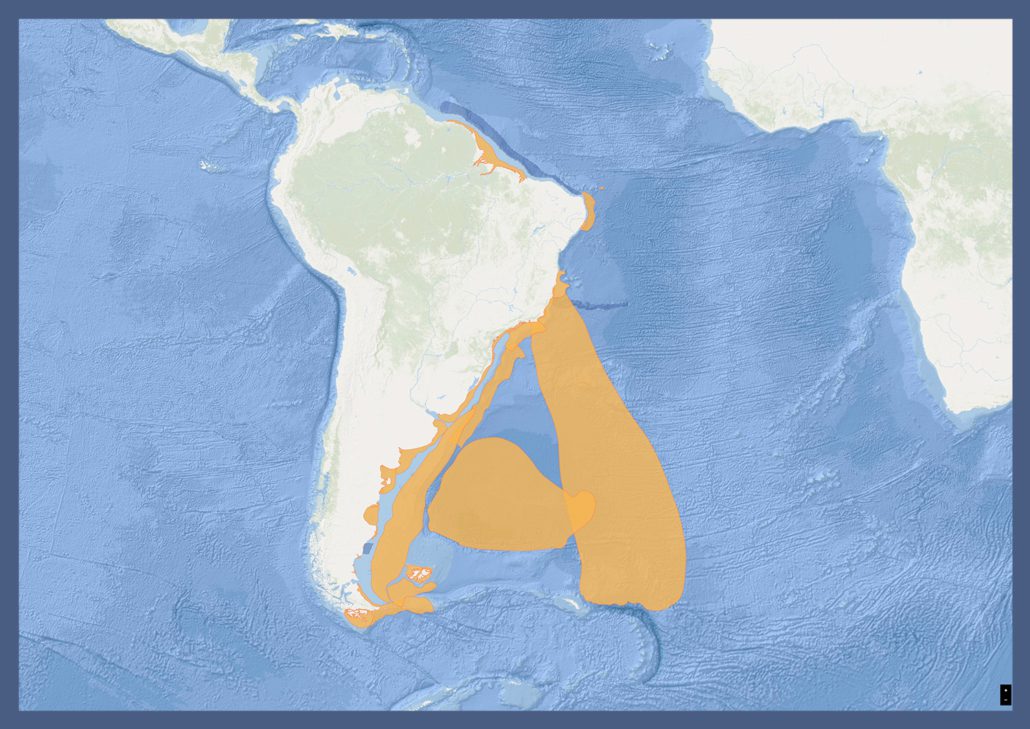South West Atlantic Ocean
Praia do Forte, Brazil, 05-09 December, 2022
From 5 to 9 December 2022, the IMMA Regional Workshop for the South West Atlantic Ocean was held in person, but with some online access, in Praia do Forte, Brazil, with the goal to identify and delineate discrete portions of habitat as Important Marine Mammal Areas — IMMAs — throughout this region. The IMMA Secretariat of the IUCN Marine Mammal Protected Areas Task Force (the “Task Force”) collected 84 preliminary Areas of Interest (pAoI) prior to the meeting and by Day 2, this had expanded to 112 pAoI. Through the workshop, many pAoI were considered redundant or were amalgamated. At the close of the workshop, through the expert-based process utilizing dedicated selection criteria, 36 candidate IMMAs (cIMMAs) were proposed, and sent for external review. Six additional areas were advanced as AoI to be retained for the IMMA e-Atlas. Following independent review and consideration of how the criteria supported IMMA identification, 33 IMMAs were accepted for full status with 5 submissions being reserved as AoI, all of which now appear on the IMMA e-Atlas.
The South West Atlantic Ocean (SWATLO) Region covers nearly a quarter of the Atlantic Ocean. Its rich biodiversity features migrating southern right whales (Eubalaena australis), humpback whales (Megaptera novaeangliae) and sei whales (Balaenoptera borealis), some of which travel from Antarctica to this region. Besides the prevalent spinner (Stenella longirostris) and common bottlenose dolphins (Tursiops truncatus), there are species endemic to the region including the Commerson’s dolphin (Cephalorhynchus commersonii), the vulnerable franciscana (Pontoporia blainvillei), the vulnerable Lahille’s bottlenose dolphin (Tursiops truncatus ssp. gephyreus) and the near threatened Guiana dolphin (Sotalia guianensis), all of which are susceptible to entanglement in gillnets. The vulnerable West Indian manatee (Trichechus manatus) is found along the coasts of the Guyanas and northeastern Brazil. The full list of marine mammal species included in the region’s IMMAs, together with the boundaries of accepted IMMAs, will become available as part of the IMMA e-Atlas.
The workshop was attended by 31 experts (Fig. 4; Annex I), plus 2 observers, both connected remotely. Of the 31 experts, 26 participated in person throughout the week while 5 participated remotely. There were 7 participating members of the IMMA Secretariat in attendance and 1 remote. In summary, the participants came from the Atlantic-facing countries of South America, including (from north to south) Suriname, Brazil, Uruguay and Argentina, as well as from the Falkland Islands (Malvinas). Additionally, some participants had expertise in the area being considered but were based in France, Italy, United Kingdom, or the United States of America.
The workshop was organised by the Task Force with support from a partner grant with the Global Ocean Biodiversity Initiative (GOBI) funded by the German government’s International Climate Initiative (IKI). Additional funds were provided by OceanCare and Animal Welfare Institute, with substantial local support and hosting from Instituto Baleia Jubarte.
